Romania’s Election Aftermath
Last weekend Romanian voters elected Nicușor Dan in a high-stakes, high turnout election. Following the election Moldovan President Maia Sandu was among the first to congratulate President-Elect Dan on his victory writing on her facebook:
"I spoke on the phone with the elected president of Romania, Nicușor Dan, whom I congratulated for the trust given by the Romanian citizens and to whom I conveyed that he can count on the Republic of Moldova."
Congratulations also poured in from around the world and specifically across the European Union with many national leaders calling Dan and giving congratulations. A notably exception was the United States. The US Embassy in Bucharest remained silent for more than 40 hours before posting a short congratulatory message on their facebook page.
George Simion conceded the election in the early morning hours of Monday May 19th, but quickly backtracked and continued to spread conspiracy theories about the election being rigged against him. Simion appealed to the Constitutional Court of Romania, calling on them to annul the elections on the basis of fraud. In his argument he claimed that social media algorithms were “manipulated” by France and that €100 million euros was spent mobilizing and transporting voters in Moldova. He also claimed that he only conceded the election to avoid a "bloodbath."
Responding to the accusations Moldovan government spokesman Daniel Vodă stated:
“Romanians in the Republic of Moldova voted freely. The large number of people who voted in the Republic of Moldova for the presidential elections in Romania shows how much they care about the future of Romania. Electoral campaigns can be accompanied by tensions and emotions, but, out of respect for all Romanian citizens, we appeal to political actors to avoid unfounded accusations and insults against voters in the Republic of Moldova."
Simion himself admitted that his campaign did not have evidence of this fraud in a video appeal he made to his voters where he asked them to send in evidence that they may have. Romania’s Constitutional Court rejected his appeal and certified the election of President-Elect Dan.
Telegram and Stop the Steal
On election day, Sunday May 18th, Telegram CEO Pavel Durov weighed into the campaign by posting on X that the French Intelligence Service (DGSE) had approached him to ask that he ban “conservative” voices on his platform ahead of the elections. Durov claims that he refused these requests categorically. DGSE and the French Foreign Ministry categorically denied these claims.
On May 20th, the same day that Simion made his appeal to the Constitutional Court, Romanian media reported the start of a mass social media campaign supporting his claims on facebook, X, Tiktok and Telegram. The campaign made 2 primary claims, that France used social media to rig the elections and that Moldova falsified election results. The social media campaign called on people to mobilize for mass protests and to sign a petition asking that all dual Moldovan-Romanian citizens be purged from the voting rolls and have their citizenships taken away.
Simion himself went to Paris and appeared in a press conference alongside far-right MEP Marion Maréchal to accuse French President Macron of rigging the election against him.
In Moldova, Igor Dodon has latched onto Durov’s accusations and has now alleged that interference over Telegram was used to rig Moldova’s 2024 presidential elections in favor of Maia Sandu. Dodon said that after the 2025 parliamentary election he would invite Durov to Chisinau “to testify about the election fraud by some Western countries in favor of the PAS party and Maia Sandu.” His went on to state that this testimony would “surely” provide the new parliament the evidence needed to annul those elections and remove President Sandu from office.
Presidential spokesman Igor Zakharov pushed back noting that “Maia Sandu was elected twice by people who want a fair Moldova” and listing off the many efforts by the Kremlin to undermine Moldova’s elections.
For his part, Durov wrote on X that he is prepared to travel to Romania saying, “I am ready to come and testify if it helps Romanian democracy.”
George Simion’s ban on entering Moldova remains in effect. A scheduled court hearing on May 19th where Simion’s lawyers intended to challenge the ban was postponed without stated reason or date of rescheduling.
International Affairs & Security
Here’s a roundup of the other top international affairs stories of the week:
President Sandu attended the 6th European Political Community Summit in Tirana Albania last weekend. The event was attended by 47 heads of state and government as well as top leaders from the EU institutions. President Sandu met on the sidelines with various EU leaders, the UK prime minister and Ukrainian President Volodymyr Zelensky. She followed the summit with an official visit to Montenegro where the two countries agreed to cooperate more deeply on their common path towards EU membership.
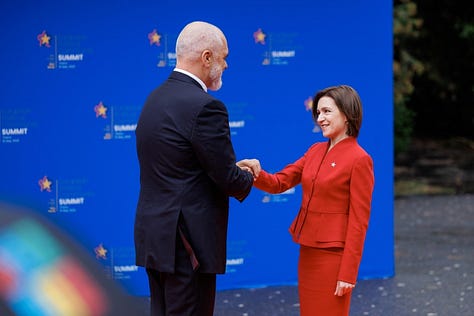
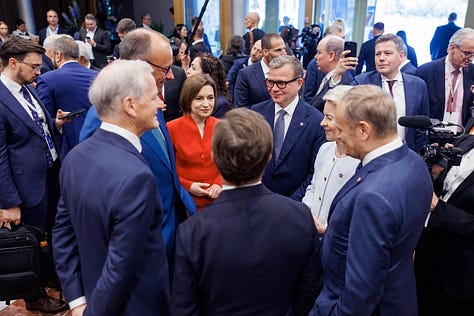
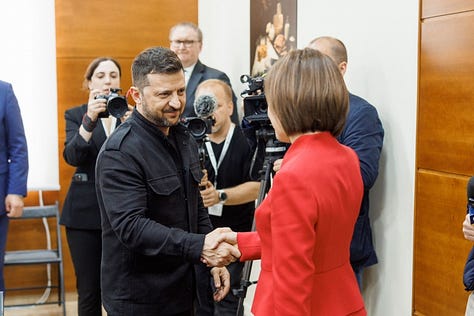
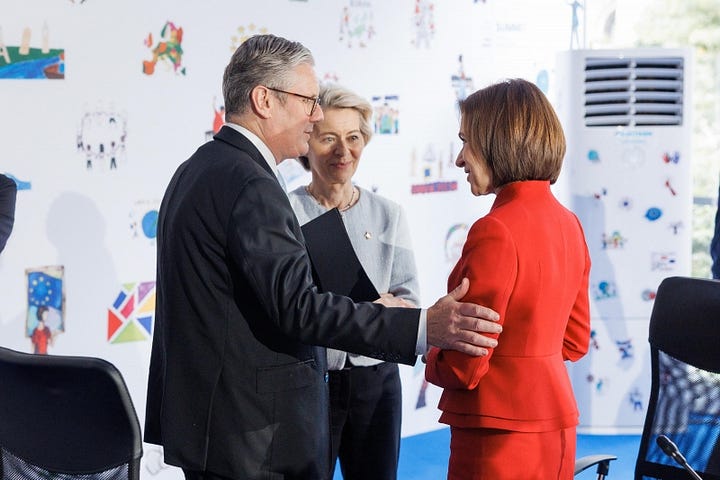
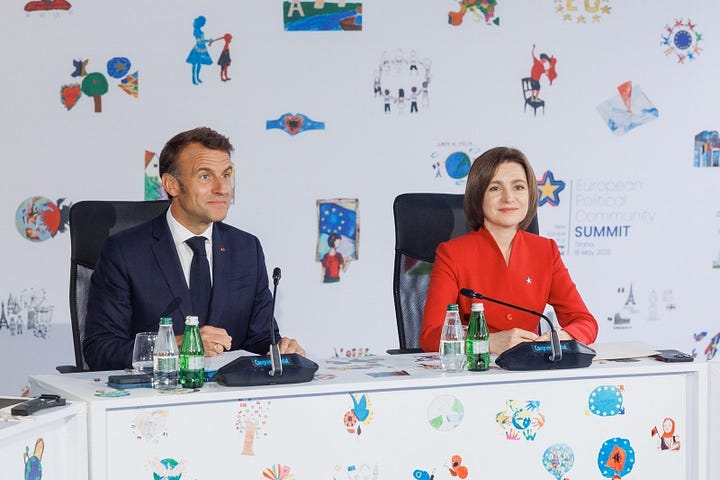
The European Union has approved the extension of the EU Partnership Mission in the Republic of Moldova (EUPM) for another 2 years. The civilian advisory mission was first launched in April 2023 and given a 2 year mandate to assist the Moldovan government with security challenges and hybrid threats.
The European Union has announced $6.2 million dollars of support for Radio Free Europe / Radio Liberty (RFE/RL). The network of news sites and radio stations is locked in a court battle with the Trump Administration which is attempting to choke off funds to the broadcaster in spite of Congressional appropriations. Europe’s top diplomat Kaja Kallas announced the EU would not be able to support global RFE/RL operations but that it would allow the network to:
"work and function in those countries that are in our neighborhood and that are very dependent on international news."
Romanian President-Elect Nicușor Dan answered a question about his first foreign trip saying: "The Republic of Moldova, Brussels or Washington, depending on the needs. I would really like the Republic of Moldova because it is symbolic, but if emergencies arise, one or the other of the alternatives." He went on to promise continued support for Moldova’s EU aspirations, joint energy interconnection projects and to quickly solve “two functional, seemingly trivial problems. The time spent in customs between the two states and the circuit for obtaining Romanian citizenship. These two issues must be resolved.1”
Politico has released an investigation into mercenary Horațiu Potra, head of Calin Georgecu’s security. The investigation is too long to properly summarize here but it is worth a read in full. It details operations conducted by Potra across Africa and how mercenaries who previously worked for him had told loved ones about past deployments to Moldova “to take part in destabilization efforts during pro-Russian protests in neighboring Moldova.” This investigation again highlights ties between Romania’s far right, the Kremlin and Moscow’s attacks against Moldova.
PAS Proposes Aggregating National Security Powers to the Presidency
One of the main stories in politics this week is a series of bills proposed in parliament to consolidate national security powers under the presidency. The first of these bills would grant executive powers to the Supreme Security Council (SSC) under the president. PAS MP Lilian Carp submitted the bill for public consultations proposing to make the SSC "the central decision-making body in the field of national security." It would give the body executive powers around key national security issues and the ability to enforce their orders with fines or imprisonment.
In its current form the SSC is a consultative body and all executive powers reside in the government.
A second bill would move control of the Center for Combating Disinformation (STRATCOM) to the presidency as part of the SSC. Taken together these proposals would give the president the power to appoint and dismiss various top officials related to the SSC - powers currently held by parliament.
Chisinau Mayor Ion Ceban made remarks opposing the bill saying that it would “transform the state into a presidential republic without amending the Constitution.” He called it part of an effort to establish a “dictatorship” and stated that “PAS is preparing to lose the parliamentary elections.”
Presidential spokesman Igor Zaharov defended the bill stating:
"The Constitution of the Republic of Moldova provides that the president is the guarantor of sovereignty, national independence, unity and territorial integrity. In order to exercise these powers, the head of state must have adequate instruments and mechanisms, in strict compliance with the fundamental law.”
The Socialist Party has called the bill unconstitutional and will oppose it in parliament and in the courts.
Legal experts have also criticized the bill as being too expansive and lacking clear checks on the power of the SSC. Alexandru Bot from Watchdog warned of the potential to expand these powers in an “unrestricted” way if “national security” is invoked. This could allow the SSC to wield power over the economy, media and potentially infringe on civil liberties.
PAS MP and Chair of the Parliamentary Committee for National Security Lilian Carp stated that he is gathering this feedback calling it “good criticism.” He promised that the bill would not be registered officially until there were further consultations and it was improved.
Other Political News
Here’s a roundup of the other top politics stories of the week:
At the request of Chisinau Mayor Ion Ceban the Municipal Council has adopted a bill banning the Pride March. The bill bans holding any meetings, marches or public events "promoting sexual and gender diversity" and justifies this ban in the interest of “protecting public order and the interests of children." The PAS faction on the Municipal Council walked out in protest leaving the MAN and Socialist members to vote in the bill. Lawyers have noted that this ban is entirely symbolic as the Municipal Council does not have the power to ban public meetings or otherwise infringe on freedom of speech, assembly or association. More than 30 countries put out a joint statement through their embassies supporting Pride and LGBTQ+ rights. The United States was not among them.
Controversy continues over the new 12th grade history textbook. Back in February we wrote about a controversy regarding the book and the perception that it downplayed Romania’s role in the holocaust2. Minister of Education Dan Perciun had promised to submit the book to Israeli Holocaust memorial Yad Vashem for review. This review is now complete and the Minister has said that while local historians had approved the text, Yad Vashem was "more critical," "But there is nothing fundamental that could serve as a reason for removing the textbook." The Jewish Community of Moldova has stated that the Minister’s words “directly contradict the critical conclusion” of Yad Vashem and called for the book to be rewritten and the opinions of experts to be respected. They have stated that they are preparing to go to court to challenge the book.
The Ministry of Education will fully renovate 15 more schools. These 15 schools will be added to the 35 already in the “Model Schools” program and will be renovated with modern equipment, furniture and facilities. The Council of Europe Development Bank allocated 35 million euros to fund this process.
Parliament has ratified the 1.9 billion euro EU Growth Plan for the Republic of Moldova. The money will be dispersed to Moldova in tranches twice yearly subject to the government achieving various reform milestones. Investments will include construction of a Chisinau-Ungheni highway, 2 modern regional hospitals in Balti and Cahul, water, sewage and road infrastructure in towns and villages and major energy efficiency upgrades for public and private buildings. The parliamentary opposition abstained from the vote. Speaking of the significance of this program Prime Minister Recean stated:
"This is the first time that the Republic of Moldova will make so many investments in such a short time, a fact only possible thanks to the EU and our friends. This means joining the EU - we are already becoming a European state, not just geographically,"
Crime, Corruption and Justice Reform
Here’s a roundup of the top stories in justice of the week:
The Superior Council of Magistracy (SCM) will propose Prosecutor General Ion Munteanu and lawyer Leonid Chirtoacă as judges on the Supreme Court of Justice (SCJ). Both men were evaluated as part of a pool of 5 potential candidates and gathered the most points on the rubric. Their candidacy will be proposed to President Sandu for appointment.
Moldova extradited Georgian citizen Michail Chkhikvishvili to the United States on May 22. We wrote about Chkhikvishvili aka “Commander Butcher” of the “Maniac Murder Cult” last year. FBI Director Kash Patel praised the partnership with the Moldovan authorities saying:
"These allegations are outrageous, and thanks to the work and partnership between the FBI and Moldovan authorities, Michail Chkhikvishvili was brought to the United States to face trial in our justice system"
Read more about the story in last Summer’s coverage:
Economics and Infrastructure
Here’s a roundup of the top economics stories of the week:
Moldova set a record high in April for renewable energy production. That month 36% of total energy consumption came from renewable sources. Right now the total installed renewable capacity exceeds 665 MW, and 8x increase over the last 4 years. The Ministry of Energy estimates that 20% of all consumption annually will come from renewables this year.
Polish company Maspex has offered to buy 50% of Moldovan winery Pucari. The offer price is 50% above the company’s trading price on the Bucharest Stock Exchange. Maspex is the largest private food company in Poland with iconic alcohol brands such as Becherovka. The purchase price is estimated at €83 million euros.
Starting August 1st MoldovaGaz will be replaced as the main gas supplier to end consumers by state enterprise Energocom. The decision was made by the National Agency for Energy Regulation (ANRE) based on EU directives to unbundle supply, transportation and distribution in the gas market. Originally the unbundling deadline was set in September 2026 but the ANRE chose to move it up to July 31, 2025 after assessing risks associated with GazProm’s current supply arrangement with Transnistria. Little is expected to change for end users except the name on their bill. MoldovaGaz and Energocom will collaborate through the end of the year on customer service work before fully transferring this competency to Energocom.
This issue of Moldova Matters is supported by Rotary Club Cosmopolitan — Club Secretary Luc Vocks invites you to join an English-speaking (mostly) expat club that meets weekly to hear from engaging speakers and enjoy some light networking. If you're curious to learn more or would like to attend a meeting as a guest, feel free to contact l.vocks@developmentaid.org.
These problems may seem trivial, and they may be trivial for many Romanians, but they are very serious in Moldova. Customs clearance and border checks between Moldova and Romania have been plagued by delays and issues for years. Much of the blame has traditionally fallen on Romania which has not previously made fast border clearances a priority. Similarly, processing times for people seeking to regain Romanian citizenship lost by family members during the Soviet period can run many years. If these issues are indeed solved, then this would be a very concrete gesture to the voters in Moldova who so overwhelmingly supported Dan’s election.
Amazingly it teaches the 1941-1945 period without mentioning the holocaust at all.


